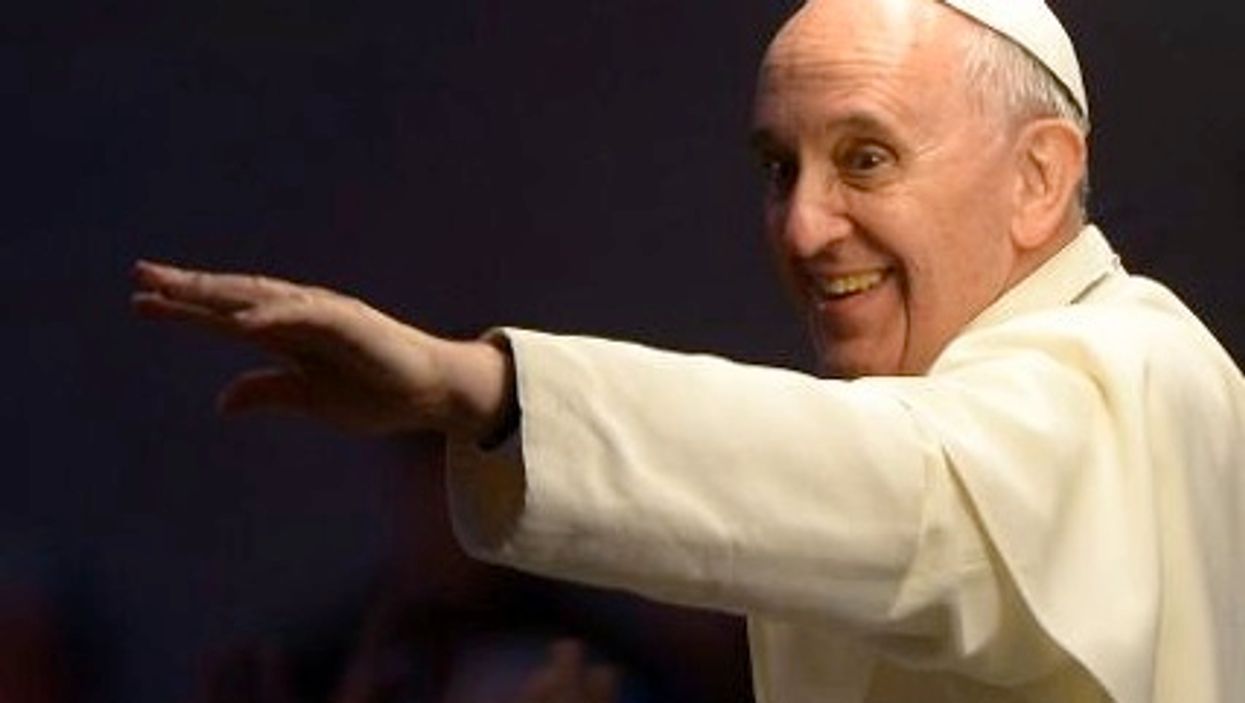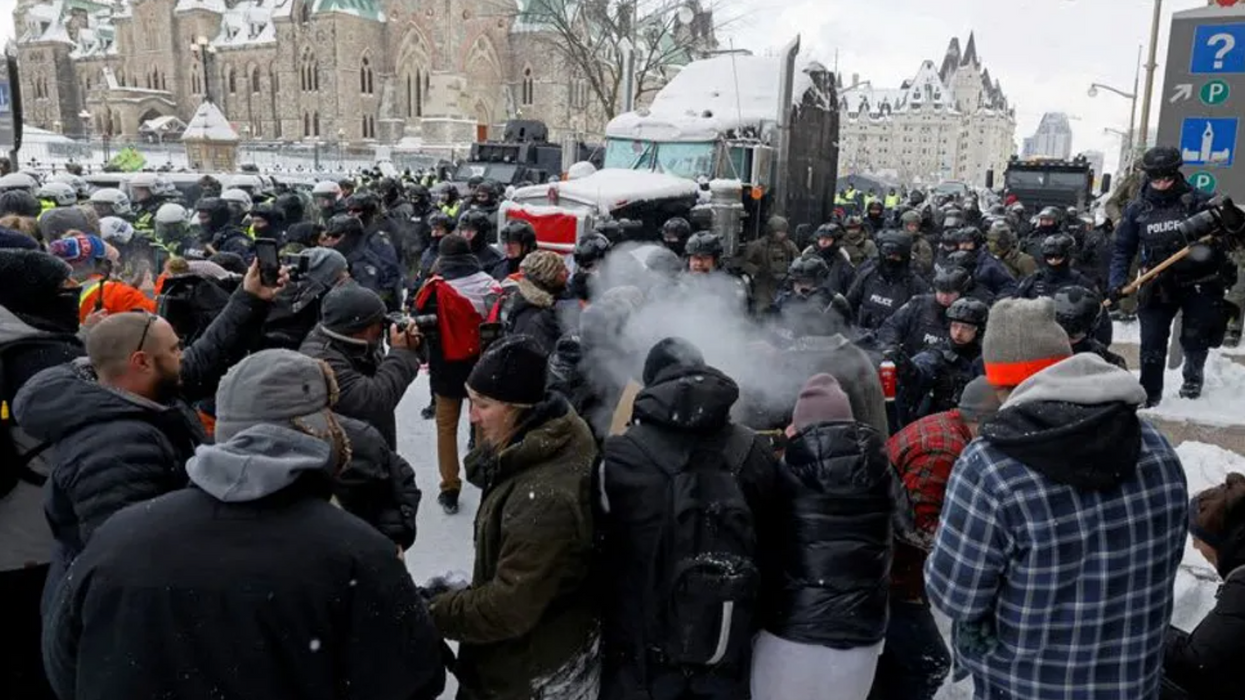Pope Francis met with Indigenous people in Canada on Monday to deliver a long overdue apology for the Catholic Church’s role in the system of boarding schools that perpetrated acts of cultural genocide against Native tribes.
"I humbly beg forgiveness for the evil committed by so many Christians against the Indigenous peoples," Francis said at the site of a former boarding school outside of Edmonton, Alberta. He spoke to a crowd of Indigenous people, including many survivors of the brutal school system.
"I ask forgiveness, in particular, for the ways in which many members of the Church and of religious communities cooperated, not least through their indifference, in projects of cultural destruction and forced assimilation promoted by the governments of that time, which culminated in the system of residential schools," the pope said.
The Indian residential school system established by the Canadian government continued over 150 years, from the mid-19th century through the 1970s. Over 150,000 Native children were removed from their families and communities to attend these boarding schools. Their goal was forced assimilation and the destruction of intergenerational bonds so that Native languages, customs, and culture could not be passed on and would eventually die out. Children in these schools were given uniforms in place of traditional clothing and were forbidden from speaking their native language. Corporal punishment was standard; physical and sexual abuse were common. Many schools were underfunded, unsafe, and unsanitary, and disease was rampant.
These conditions caused the premature deaths of over 4,000 Native children, many of whom were buried in mass unmarked graves which have been discovered within the last few years. The education students received was poor: History didn’t begin until Europeans discovered the New World, and much of the training was vocational – unpaid child labor that only prepared Native children for a career of subservience and poverty.
Three-fourths of these schools were run by the Catholic Church.
The Canadian government has also issued apologies for the policy, and taken responsibility for its grievous long-term effects on Indigenous communities. In 2008, the Canadian government issued an apology and established the Truth and Reconciliation Commission to investigate the system of Indian boarding schools, to collect stories and testimony from survivors, and to complete a full report.
Prime Minister Justin Trudeau reiterated this apology in 2015 when the Commission finalized its report, saying, “The Government of Canada ‘sincerely apologizes and asks forgiveness of the Aboriginal peoples of this country for failing them so profoundly.’” Trudeau apologized again last year when graves of Indigenous children were found at the sites of several schools. The Canadian government has also moved beyond mere words and passed a bill to pay $2 billion in reparations to survivors of the school system. It was Trudeau who requested that the Pope also issue a formal apology to the Indigenous peoples of Canada, in keeping with the Commission’s recommendations, when he visited the Vatican several years ago.
A papal apology on behalf of the entire Catholic Church is not unprecedented, but is still a relatively recent phenomenon. Pope John Paul II was the first to do this, and as the head of the church, he apologized for the Catholic Church’s participation and complicity in the African slave trade, the Crusades, the Inquisition, the burning of heretics and witches, the marginalization of women, the persecution and genocide of Jews during the Holocaust, and rampant sexual abuse by clergy, among other things.
During the Great Jubilee of 2000, John Paul II declared a day of Prayer for Forgiveness of the Sins of the Church, which was met with some resistance amongst those in the church. Some argued that the Pope did not have the authority to speak for the entire Catholic church, including the church of the past. Others argued that such an apology would besmirch the church's reputation, create an appearance of weakness, and lead to political consequences in Muslim countries. These concerns, however, did not outweigh the Christian imperative to seek forgiveness of God and those who were wronged. Later popes followed his example: Pope Benedict XVI also apologized for clerical sexual abuse, and Pope Francis, the first pope from the Western hemisphere, has aploogized for Catholic colonialism in the Americas.
But Pope Francis required some persuasion to issue a formal apology to the Indigenous people of Canada. Earlier this year, a delegation of Native Canadians visited the Vatican, to share survivor’s stories and their desire for reconciliation and healing. On Friday, April 1, the Pope issued a formal apology to Indigenous Canadians for the church’s part in Canadian boarding schools, and promised to come to Canada and be with them for the feast of St. Anne, a saint venerated by some Native tribes, which occurs on July 26.
The pope’s apology was met with mixed emotions. Many indigenous people were touched that the Holy Father kept his promise by making his first trip to Canada, and moved by his sincere words of remorse. The four chiefs of the Cree nations presented Francis with a ceremonial headdress, a symbol of honor that is typically only bestowed on men within the tribe who have earned such a distinction through valor or leadership. Still others were skeptical, and felt that the Pope’s apology was hollow. “Kneel down the way you made us kneel down as little kids and ask for that forgiveness,” said one survivor, in an interview with CNN.
But everyone agrees that this formal apology must be the first step in a journey of repentance and reconciliation. “This apology validates our experiences and creates an opportunity for the church to repair relationships with Indigenous peoples across the world,” George Arcand Jr., Grand Chief of the Confederacy of Treaty Six First Nations, said. "It doesn’t end here," he added. "There is a lot to be done. It is a beginning.” Phil Fontaine, a former chief of the Assembly of First Nations and a boarding school survivor, expressed a similar hope. "This is a special moment for our people,” Fontaine said. “It's the beginning. It's the start." And Francis himself agreed. "Begging pardon ... is only the first step, the starting point," he said. "An important part of this process will be to conduct a serious investigation and to help the survivors of residential schools."
The Pope’s stop in Alberta was just the first of a nearly weeklong trip throughout Canada. He will meet with Indigenous tribes at the sites of two other schools as well.
This historic trip to Canada has implications for the United States as well. Some tribes have noted that the Pope’s apology did not extend to Natives who experienced similar abuses in boarding schools in the United States. While only a small proportion of the residential schools in the United States were Catholic, the boarding school system in the United States served as a model for those in Canada.
But perhaps Francis has not sought out reconciliation with Native Americans because the United States government has made little effort to do so. A general apology to Native Americans for the government’s treatment of Native Americans was buried in a defense bill passed in 2010. President Barack Obama signed it, but the apology was not officially read or announced. The apology also included language to avoid claims of legal liability and prevent the statement from being used in lawsuits against the government. The first investigative report into the scope of Native American boarding schools was only just published in May 2022 in compliance with a directive from Deb Haaland, current Secretary of the Interior and the first and only Native American cabinet member in U.S. history.
The report identifies the names and locations of 408 Indian boarding schools that the United States’ government either ran or financially supported between 1819 and 1969. The report also locates 53 burial sites of children conscripted into the school system. However, this initial report is far from complete. The report lacks detailed data about each of the schools, and more research is needed as to the long-term effects of this system on Native American people.
Last month, Haaland spoke to the Senate Committee on Indian Affairs advocating for a Truth and Healing Commission, akin to that in Canada, which could continue with this vital research. A bill has since been introduced by Senator Elizabeth Warren, but time will tell whether the federal government is finally ready to own up to its predecessors' misdeeds.
The pope's visit to Canada highlights the failure of the United States’ sacred and secular institutions to take responsibility for the evils they have committed. For as Francis said earlier this year, “without historical memory and without a commitment to learning from past mistakes, problems remain unresolved and keep coming back….The memory of the past must never be sacrificed at the altar of alleged progress.”












